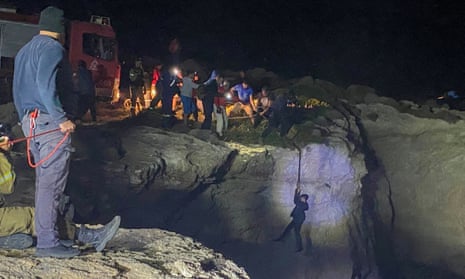Search and rescue operations are under way in the west and east of Greece after refugees desperate to reach Europe were involved in two separate disasters just hours apart, the country’s coastguard said.
Almost 12 hours after two vessels sank in the Aegean sea, rescue workers hampered by inclement weather were in a race against the clock on Thursday to find survivors as authorities reported that at least 16 women and a boy had died when an overloaded boat capsized east of the island of Lesbos.
“These are both very difficult operations … due to the strong winds which have been raging relentlessly on both sides of the coasts since last night,” said the Greek coastguard’s spokesperson, Nikos Kokkalas, describing those who had managed to make it to land as “utterly panicked”, adding: “The [dead] women were all from African countries, aged 20 upward.”
The dinghy had set sail with about 40 passengers under cover of darkness from the Turkish coast. While the bodies of 17 people had been recovered and 10 had been saved, a dozen were presumed missing.
In a separate incident hundreds of miles west, at least five people were thought to have died overnight when another boat ran aground off Kythira, to the south of the Peloponnese. In winds of up to 63mph (101km/h), the vessel went down in a notoriously rocky area east of the island’s main port of Diakofti. Local media said about 100 people from Iraq, Iran and Afghanistan were thought to have been crammed on to the sailboat, and that passengers screamed for help as the boat foundered and sank.
By Thursday morning, 80 people had been rescued, of whom at least 13 were taken to Kythira’s hospital.
“If 100 people were on the boat, as I understand that is what they themselves are saying, 80 have been saved and 20 are still missing,” the island’s mayor, Stratos Charchalakis, told ERT TV. “I saw five people drown in front of my own eyes. The boats that are being sent from Turkey are moving bombs … They are small sailboats that shouldn’t have more than 15 or 20 persons onboard, and they have 100.”
Kokkalas, the coastguard spokesperson, said the vessel that sank off Kythira had been “completely destroyed”, and locals described how they watched in horror as the boat crashed into the rocks.
“We could see the boat smashing against the rocks and people climbing up those rocks to try to save themselves. It was an unbelievable sight,” a resident, Martha Stathaki, told the Associated Press. “All the residents went down to the harbour to try to help.”
Although Kythira is about 250 miles west of Turkey, it is part of a southern route increasingly used by smugglers intent on bypassing Greece, where patrols have been reinforced, and heading directly to Italy.
After the incidents, the Greek migration minister, Notis Mitarachi, issued an “urgent call” to Turkey to “take immediate action to prevent all irregular departures due to harsh weather conditions”.
“Already today many lives lost in the Aegean, people are drowning in unseaworthy vessels. EU must act,” he said on Twitter on Thursday.
The Greek prime minister, Kyriakos Mitsotakis, also expressed sorrow for the tragic loss of life as he attended an EU meeting in Prague. Speaking to reporters he said: “I think this is a time to really cooperate much more substantially in order to avoid these types of incidents occurring in the future and to completely eradicate the smugglers who prey upon innocent people, desperate people who try to reach the European continent in vessels which are clearly not seaworthy.”
Athens has accused Ankara of flouting a landmark agreement reached with the EU in March 2016 to stem flows of refugees and migrants by deliberately pushing people across Greek land and sea borders as part of a broader “weaponisation” policy.
Last month the Greek migration ministry said it had prevented about 150,000 people illegally entering the country so far this year, though rights groups say many have been prevented through a policy of pushbacks, in contravention of international law.
As the EU’s southernmost member state, Greece is among the countries on the frontline of east-to-west flows of people desperate to escape poverty, persecution, and dangers linked with the climate crisis, in Asia, Africa and the Middle East.
Recently, the Greek coastguard said the number of people it had rescued this year had more than doubled compared with 2021, when fewer than 600 people had been saved in Greek waters.
In a statement this week sent to the Guardian in response to a report about the difficulties faced by Afghan refugees, Mitarachi said: “Greece has repeatedly affirmed that it will continue to protect its borders, and that it will not allow smugglers to choose who enters the European Union. Common action is needed to alleviate human smuggling … We must crack down on migrant smugglers keen to exploit human pain for financial gain.”
Athens has fiercely denied accusations of pushing back asylum seekers before they are able to file claims. On Wednesday, Mitarachi countered that Turkey was “violently pushing forward migrants to Greece, in violation of international law”.
The Turkish president, Recep Tayyip Erdoğan told the United Nations general assembly last month that Greece’s “oppressive policies” towards refugees and migrants were turning the Aegean into a “graveyard”.
